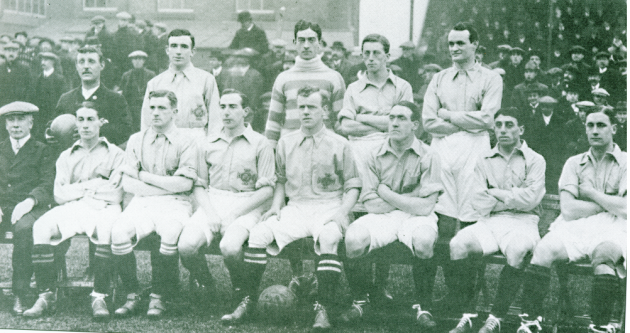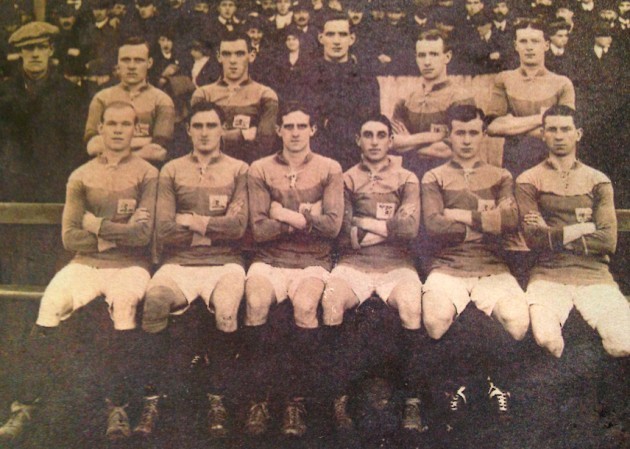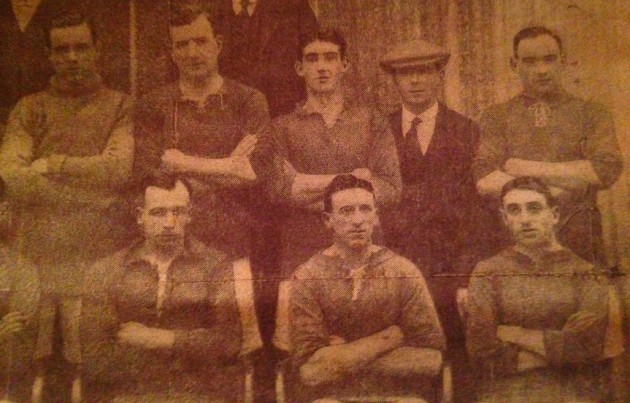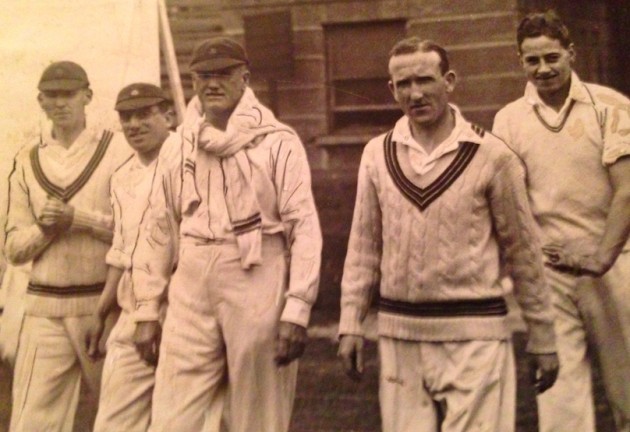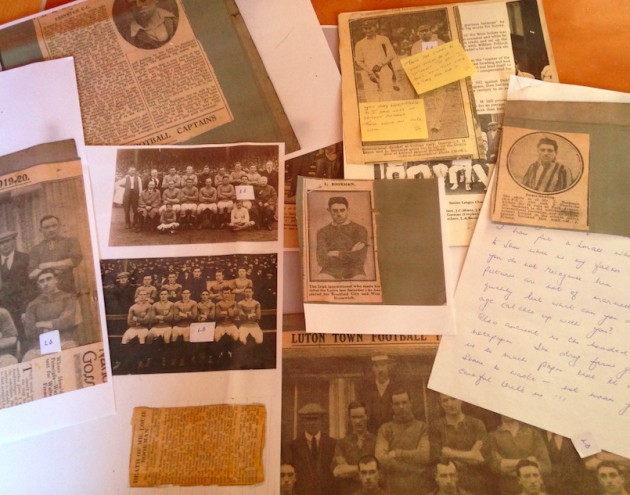KNEE-DEEP IN RESEARCH, I came across an old photograph online. It was from the 1914 British Home Championship – the only time in Ireland’s history that they won the tournament, beating England, Scotland and Wales to the crown.
Scanning the back row, I recognised Patrick O’Connell – not-yet ‘Paddy Don Patricio’, the legendary manager of Barcelona, Real Betis and Sevilla – but then a defender at Sheffield Wednesday. Seated in front of him though was an unusual figure. In some ways, he was just like the other players – the arms folded, the hair neatly Brillantined. But it was the dark skin that intrigued. The accompanying caption told me his name was Louis Bookman. And so a remarkable tale began to unravel.
During the mid-to-late 1900s, Jews based in the Russian Empire were faced with relentless attacks. These pogroms forced many to flee Eastern Europe and seek new lives elsewhere. Among the displaced were the Buchalters, a large family from Zagaren in modern-day Lithuania. The patriarch, Mathias, was a rabbi and planned to sail to New York with his extensive brood and leave the abuse, the violence and persecution behind. Louis, who was a young boy at the time, and his eight siblings endured an arduous journey towards the New World but some solace was provided by a temporary stop in southern Ireland. Legend has it that when the ship’s captain shouted out ‘Cork’, the Buchalters misheard, disembarked and their lives changed forever.
It’s not known how long the family remained on Leeside or when they finally came to arrive in Dublin but they changed their name to Bookman and eventually made the capital their home with Mathias becoming a chazan (or cantor) in the Lennox Street synagogue. Unsurprisingly, Louis’s was an intensely traditionalist upbringing but his excellence on the sports field ensured it wasn’t just his ethnic minority status that defined him. Turning out for Jewish team Adelaide, he won the Under-18 All-Ireland in 1908 – the side became the first all-Jewish group to take the honour. But, writing in Does Your Rabbi Know You’re Here, an absorbing history of Jewish footballers, Anthony Clavane suggests Louis’ talents weren’t appreciated by his parents, who felt it went against his faith.
Bookman’s passion for sport was deemed by his parents to be fundamentally un-Jewish. For Mathias and Jane Bookman, and thousands of other impoverished families from Eastern Europe, status was achieved by Talmudic (the Talmud is a Jewish text) learning and observance.”
Still, despite a probable morale dilemma, Bookman played on. And the first senior team he joined was Belfast Celtic in 1910, racking up a number of appearances. While still with the club, he turned out for an Irish amateur selection in a 0-2 defeat against England. Not long after that, quite remarkably given his lack of experience, he was signed by reigning FA Cup champions Bradford City – making history as the first Jewish footballer to play in the top-flight. Unsurprisingly though, it was a struggle.
Bookman was nicknamed ‘Abraham’ as soon as he arrived at Valley Parade, but as the team huffed and puffed their way to a mid-table finish in his debut season, many fans pointed the finger of blame at the small, mysterious and Jewish inside-left who had seemingly come from nowhere. It was a turbulent spell for Bookman, then in his early twenties. He endured rather than enjoyed his three-season stint in Yorkshire scoring just twice in 32 appearances for the club.
But he did enough to secure his very first Irish cap in 1914 as the team faced Wales in Wrexham. Ireland won 2-1, beat England the following month and rounded off a magnificent showing in the Home Nations competition by drawing 1-1 with Scotland in Belfast. Along with the rest of the winning squad, Bookman received a gold watch as his prize.
Such a success put Bookman in the shop window and he joined West Bromwich Albion later that year for the sizeable fee of £875 (the then-record was £2000). But, despite his career excelling, there was a darker and more sinister aspect to being a successful Jewish athlete in the UK.
“He was treated as an alien in the English sporting world”, according to Clavane.
In the late Victorian and Edwardian eras, Jews were openly blackballed in upper and middle class sports like golf, tennis and horse racing. Golf Illustrated argued that their ‘win-at-all-costs mentality’ was alien to the British sporting ethos and published cartoons and fictional stories depicting Jewish golfers, talking in broken English, as foreign, flashy and untrustworthy.”
Bookman’s time at West Brom lasted just one season and he returned to Ireland to play for Glentoran and then Shelbourne. But just when it seemed his career was in the doldrums, it was quickly resuscitated with a transfer to Luton Town. And it was there that Bookman excelled.
One report pronounced him ‘one of the few Jews to have climbed to the top of the football tree’. After he conjured a superb individual performance in a FA Cup clash with Birmingham, another exclaimed:
How many times has a great outside-forward won a Cup tie? Countless! Add one more to the list. Reduced to essentials, it was Bookman, the Irish international outside-left, versus Birmingham – and Bookman won”.
Luton cherished him. When Bookman was brought back into the Irish fold in 1921 for a series of appearances – including the famous 1-1 draw against England at Windsor Park,, the local paper heaped praise on their Lithuanian/Irish attacker. But where he was revered in London, back home, it was a different story.
In 1921, a newspaper report detailed how Bookman had been back in Dublin on a holiday when he came upon two British soldiers engaged in a dispute with a passer-by on Parliament Street. Moments later, the pair set upon Bookman, who was promptly mugged at gun-point. Bookman is quoted in the article:
The assailant asked me who the hell I was, and then ordered me to put my hands up quickly. He asked me if I were an Irishman and I said that I was. With an oath, he then called me ‘a fine Irishman’, pulled a revolver from his pocket and putting the muzzle to the small of my back, he ordered me to march.”
Bookman survived the scare and played one more season with Luton, trotted out a solitary campaign with Port Vale before returning for a final stint with Shelbourne.
It was there that the trail seemed to go cold.
Having sketched out a substantial amount of information pertaining to Bookman’s professional career, I still knew little of the man himself.
Some brief information alluded to an impressive ‘other life’ as a cricketer with Railway Union and with Ireland from the mid-1920s onward and he represented his country on fourteen occasions. But outside of that, it was if Louis Bookman ceased to be once his football career ended.
And then a breakthrough. From somewhere, someone passed on a phone number. I was told to call, that the person at the other end was keen to talk to me.
The person at the other end was Joyce, Louis Bookman’s only child.
“They called my father ‘Louis The Eye-Tie’ – as in ‘The Italian’ because he had darkish skin. He had slightly Latin looks”, she recalled.
“My mother, Rebecca, didn’t think that football was a good enough career. She came from Manchester and all her family were all very learned and musical and, let’s be honest with it, a bit snobbish. My mother wouldn’t marry my father until he gave up football. Therefore, they didn’t get married until 1930, I was born in 1931. I knew nothing about the football. Anything he did afterwards that I knew about was amateur. He certainly never did any football. But he played cricket. He was the first Jew to be picked for the Gentlemen of Ireland and I remember going out on Sunday afternoons to watch.”
Despite his historic achievements and the novelty of spending such a large amount of time as an athlete in the UK, Bookman never shared his sporting memories with his only child. According to Clavane, when Bookman died in 1943 aged just 52, his wife banned any talk of his time as a footballer.
Joyce admitted she wasn’t even aware her father was born in Zagaren until a few years ago.
I can’t remember him ever talking to me about football or taking me to any matches but I suppose that when he gave up football, he gave up a bit of himself.”
“He was a jeweller by trade and had a shop on Pearse Street. He didn’t make much money because when people used to come in, and he’d do their watches for them, they’d say ‘How much do I owe you?’ and he’d say ‘Ah sure, it doesn’t matter!’ So he never made any money and that was another nail in his coffin as far as my mother was concerned.”
Still, as much as Rebecca seemed to care little for her husband’s sterling athletic career, she secretly kept a stash of newspaper cuttings and photographs.
“My mother cut out all of the articles about my father that were in the paper and I’ve got a whole load of scrapbooks. I’m not that madly interested. I just have them to show the quality of the man. And I won’t let them out of my sight because they’re old and the print isn’t all that marvellous. I’ve only got one daughter and she’s got one daughter and neither are particularly interested in football but who knows? Maybe my grand-daughter will marry a man who’s absolutely mad about it?”
“My father was lovely. Looking at all the other Buchalter men, they weren’t rough and ready – they were gentlemen. They were kind and even-tempered.”
Days later, just as she promised, a thick envelope arrived at my house stashed with photocopies. There were numerous team-group shots of Bookman wearing the jerseys of various football clubs. There were cuttings of his cricket days for Leinster and one photo of him taking the field for an international against Scotland. Also, rather fittingly, there was a death notice describing his ‘remarkably brilliant career’.
In his book, Clavane references the effect Bookman had on future generations of Jewish athletes.
After Louis Bookman became the first Jew to play in the First Division, thousands of immigrant children took to the streets, playgrounds and muddy pitches, fantasising about a life of glory and impossible glamour.”
At a time when to be Jewish was to carry a social stigma, Louis Bookman also had to contend with being a dark-skinned immigrant with a strange name. Yet, he stepped above the parapet whether intentionally or not. Garnering widespread acclaim for his sporting achievements, he was understated and humble enough to not trade on his athletic prowess once he distanced himself from football. He didn’t chase fame or money. Like many stars of his generation, he simply provided for his family once the stardom faded. But unlike his peers, his level of success didn’t just stay within the boundaries of a pitch but extended to wider social issues.
His pioneering ways and his trailblazing qualities deserve the utmost recognition and celebration.
Special thanks to Stuart Rosenblatt at the Irish Jewish Genealogical Society for his invaluable help in the research of this article.
